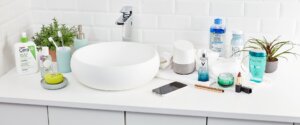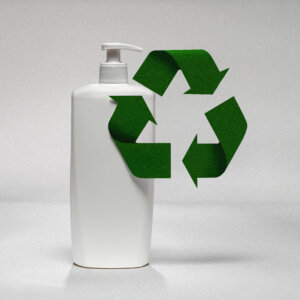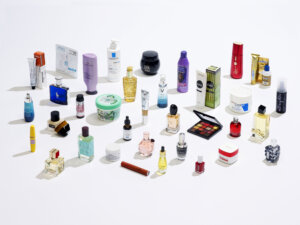L’Oréal believes that a company’s success depends on its positive contribution to society and its ability to respond to today’s global environmental issues.
L’Oréal launched the sustainability program ‘L’Oréal For the future’ in 2020 to reduce the company’s impact on the environment by 2030. The initiative helps the firm’s suppliers provide sustainable products to consumers. The initiative engages suppliers as well as consumers to make their contribution for the better future.
SUSTAINABLE PRODUCTS
96% of L’Oréal products created and renovated in 2020 have improved their social and environmental footprint.
L’Oréal products include innovative eco-friendly products like La Roche Posay and Vichy paper tubes, Fructis super food shampoo biodegradable formula, Garnier zero plastic waste solid shampoo to Kiehl’s doypack and Redken shampoo bottle with 12% less weight of packaging.
Yves Saint Laurent launched a new range of reloadable skincare called Pure Shots in 2019. The bottle and lid are thus designed to be conserved, while a plastic refill containing the formula is replaced after use.

This design helps saving a significant amount of water and reduces the carbon footprint of the product.
Elseve bottles by L’Oréal Paris are entirely made from recycled plastic, saving 7,000 tonnes of plastic globally every year.
The MY WAY fragrance bottle, by Giorgio Armani, was designed to be reused thanks to a refillable system which enables reductions of glass by 77% and plastic by 64%.
SUSTAINABLE PACKAGING

Since 2007, L’Oréal has implemented a responsible packaging policy based on three pillars known as the “three Rs”: Respect, Reduce and Replace.
The company uses a global and systematic eco-design process that includes the product, the packaging of finished products and the packaging used during transportation.
Together with biochemistry company Carbios, L’Oréal has created the world’s first bottle for Biotherm cosmetic products made from 100% biologically processed plastic.
In the future, patented Carbios technology will allow companies to endlessly process polyethylene terephthalate (PET), one of the most common types of plastic.
L’Oréal also collaborates with: Albéa, a world leader in the development and production of packaging for cosmetic products, with which the first cosmetic tube made of FSC-certified cardboard was developed; Purecycle – a project for the development of packaging obtained from recycled polypropylene (PP) solvolysis; LanzaTech and Total, with which, in October 2020, L’Oréal announced the world’s first production of a polyethylene (PE) bottle for cosmetics made from recycled industrial carbon emissions.
Six L’Oréal brands, including Garnier, Kiehl’s, NYX Professional makeup, Vichy, La Roche-Posay and CeraVe, have launched a sorting initiative to help consumers take part in waste management. Thanks to these brands, sorting bins were installed at shops alongside guidelines to reduce waste.

PWC ABOUT LIFE CYCLE ASSESSMENT
Environmental issues have sky-rocketed in the past decades.
It has led to tougher government regulation, and bigger pressure on companies, from consumers and partners demanding more eco-friendly products.
“Life Cycle Assessment (LCA)’ is an effective tool to address these tasks. It is an analysis technique assessing multi-criteria environmental impacts associated with all the stages of a product’s life from raw material extraction through manufacture, packaging and distribution up to the end of its useful life.
This approach is known as cradle-to-grave. This approach can be used to calculate the Product Environmental Footprint (PEF), the framework supported by the European Commission to develop a single market for green products.
This measure is already widespread in the construction industry across the EU.
Such standardized labelling is expected to be used in other sectors, primarily in production of clothing/textile and packaging, in the nearest future” – noted Ksenia Vardzelova, senior associate at PwC Ukraine.
SPOT AND PIL TOOLS BY L’ORÉAL
Convening a panel of 11 international experts, L’Oréal created the internal tool SPOT (Sustainable Product Optimization Tool) in 2017 to calculate the social impact of cosmetics across all its brands It quantifies the environmental and social performance of all L’Oréal’s products in every aspect of the product life cycle, including packaging, the footprint of the formula, the sourcing of the ingredients and the social benefit of the product.
Sustainability is now fully integrated into the design process of the Group’s new products, from the earliest stages.
In order to provide consumers with clear and useful information, L’Oréal launched the PIL Product Impact Labeling tool which includes a score on a scale from A to E, with an “A” product considered as “best in class” in terms of its environmental impact.
By 2022, this labelling system will apply to all the Group’s rinse-off products.
The score will give an accurate vision of the impact of a L’Oréal product by taking into account 14 planetary impact factors such as greenhouse gas emissions, water scarcity, ocean acidification or impact on biodiversity, measured at every stage of a product’s life cycle.

